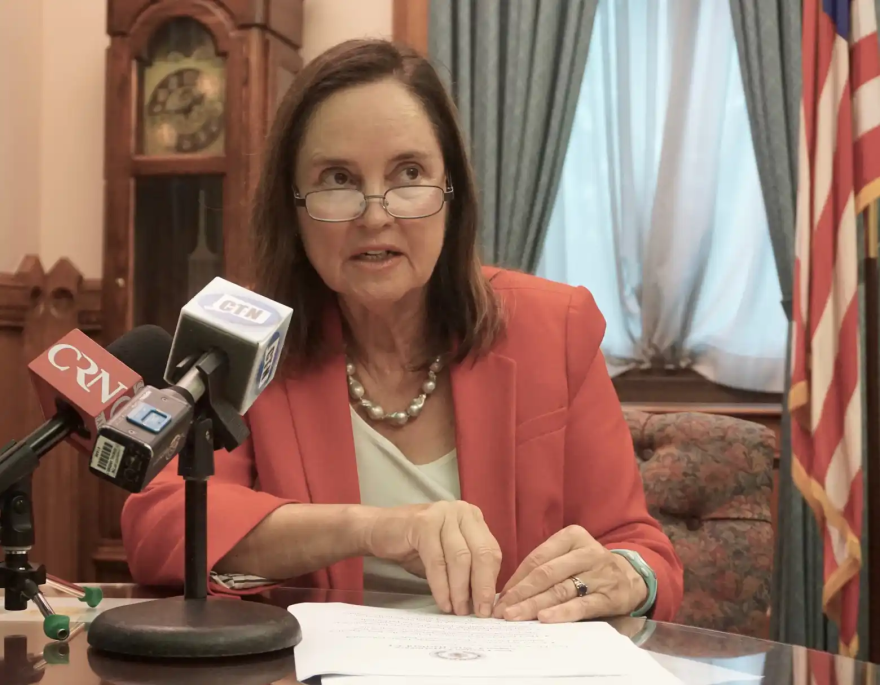Secretary of the State Denise Merrill said Tuesday she is resigning on Thursday, six months before the end of her third term and at a critical time for election officials, to spend more time with her ailing husband.
“I’m going to be able to do a lot of things, just not run an agency and run a big election. I just couldn’t face it,” Merrill said.
Her decision to resign was first reported by the Associated Press.
Gov. Ned Lamont will name a successor to finish her term and to oversee the coming elections for U.S. Senate, statewide constitutional offices and the General Assembly, as well as statewide primaries in August.
Merrill, 73, announced last June she intended to exit public office when her term expired in January 2023 after three decades in Hartford, first as a state legislator who rose to House majority leader, then as secretary of the state.
In November, she sold her home in the West End of Hartford to move back to Mansfield, the college town she represented in the House. It is close to the doctors and social circle of her husband, Stephen Leach, a retired physician.
Leach, 78, has Parkinson’s disease and fell critically ill last fall with sepsis, spiking a fever of 105. He contracted COVID-19 during what became a protracted rehabilitation stay in a nursing home.
“He’s been getting stronger, but he still gets periodic infections and has to go to the hospital,” Merrill said. “I’ve got some people coming in that help me, but you know, basically, I have to be here for him. What can I say?”
Merrill came under significant criticism in the 2020 election cycle for pressing the governor to delay a presidential primary in the first weeks of COVID and then to mail absentee ballot applications to every voter.
But her early exit, even under the circumstances, gave her pause.
“It was a harder decision than I thought it would be, honestly,” Merrill said. “I’ve been thinking about it for months.”
She said she regretted leaving the governor the burden of filling her post at a critical time, but Lamont only offered praise.
“Denise Merrill is a dear friend to me, and her exit from public service is a tremendous loss for the people of Connecticut,” Lamont said. “Denise has had a long history of serving the public good in Connecticut and has become one of the most respected secretaries of state in the country.”
Merrill is the second statewide constitutional officer to resign in six months. Kevin P. Lembo stepped down as comptroller on Dec. 31 due to a serious heart condition.
Lamont chose a successor, Natalie Braswell, who took the post promising not to run for the office, leaving an open contest for the Democratic nomination, which was won by Rep. Sean Scanlon, D-Guilford.
At stake in the primaries in August are the Democratic and Republican nominations for the office Merrill is vacating.
Rep. Stephanie Thomas, D-Norwalk, won the Democratic endorsement for secretary of the state and is backed by Merrill. Thomas faces a primary in August from Maritza Bond of New Haven, who recently won the endorsement of the AFL-CIO.
Dominic A. Rapini of Branford, the convention-endorsed Republican, faces a primary from Brock L. Weber of New Britain and Rep. Terrie Wood of Darien.
By law, the vacancy is Lamont’s to fill when the General Assembly is out of session, as is the case now. He cannot name a sitting member of the legislature to fill her term.
Lt. Gov. Susan Bysiewicz was Merrill’s predecessor as secretary of the state, serving with her in the House. Bysiewicz and Merrill were chair and vice chair of the legislative committee overseeing elections law when the state lowered the threshold to qualify for a primary from 20% to 15% of a convention vote.
“Together we worked to implement public financing, a centralized voter registration system, and improve the security of our state’s elections, all reforms which eventually were enacted in Connecticut,” Bysiewicz said.
Merrill said she supported a direct primary system that did not pass. Even with the lower threshold, Connecticut still has one of the most restrictive systems for access to a primary, making her office a frequent defendant in legal challenges.
“I was sued again today,” she said.
Attorney General William Tong, a former House member, called Merrill a champion of fair and safe elections during “an era of unprecedented and unrelenting challenges.”
“Secretaries of state nationwide have never been more critical in protecting the safety of voters and the legitimacy of our elections against disinformation and partisan voter suppression efforts,” Tong said. “Denise Merrill has set the standard for professionalism.”

